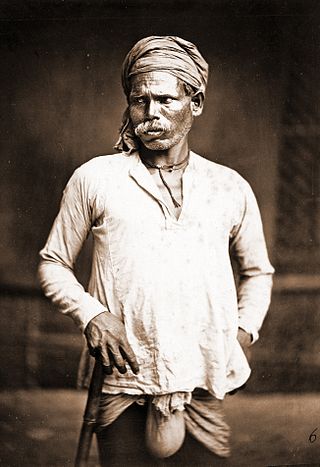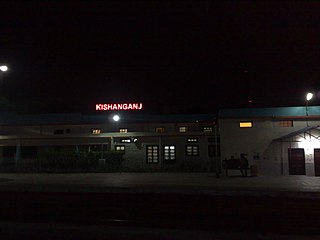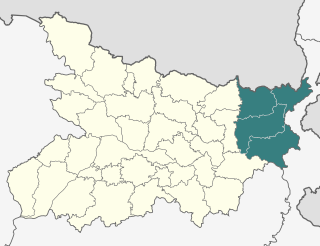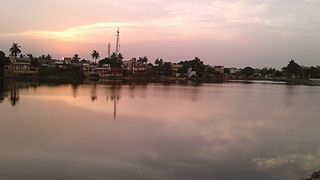Rajesh Ranjan alias Pappu Yadav, is an Indian politician from Bihar, and a member of Parliament (MP) representing Purnia constituency in Bihar.

The Dom, also known as Domra, Domba, Domaka, Dombara and Dombari, are castes, or groups, scattered across India. Dom were a caste of drummer. According to Tantra scriptures, the Dom were engaged in the occupations of singing and playing music. Historically, they were considered an untouchable caste called the Dalits and their traditional occupation was the disposal and cremation of dead bodies. They are in the list of Scheduled caste for Reservation in India in the Indian states of Uttar Pradesh, Bihar, Odisha, Andhra Pradesh, Jharkhand and West Bengal.

Purnia is the fourth largest city of Bihar and is emerging as the largest economic hub in North Bihar. It serves as the administrative headquarters of both Purnia district and Purnia division in the Indian state of Bihar. It is well known for its favourable climate like Darjeeling and has an abundance of resources for human settlements and economic activities.

Purnia District is one of the thirty-eight districts of the Indian state of Bihar. The city of Purnia is the administrative headquarters of this district. The city of Purnia has continued its tradition of hoisting the national flag at 12:07 am on every Independence Day since 1947. Purnia district is a part of Purnia Division. The district extends northwards from the Ganges river.

Kishanganj district is one of the thirty-eight districts of Bihar state, India, and Kishanganj town is the administrative headquarters of this district. Kishanganj district is a part of Purnia division (Seemanchal).

Purnia division is an administrative geographical unit of Bihar state of India. Purnia is the administrative headquarters of the division. The division consists of Purnia district, Katihar district, Araria district, and Kishanganj district. It was established in 1990. It is also known as Seemanchal. It is a part of the Kosi—Seemanchal subregion of the cultural Mithila region.

Teli is a caste traditionally occupied in the oil pressing and trade in India, Nepal and Pakistan. Members may be either Hindu or Muslim; Muslim Teli are called Roshandaar or Teli Malik.

Bihari Muslims are adherents of Islam who identify linguistically, culturally, and genealogically as Biharis. They are geographically native to the region comprising the Bihar state of India, although there are significantly large communities of Bihari Muslims living elsewhere in the subcontinent due to the Partition of British India in 1947, which prompted the community to migrate en masse from Bihar to the dominion of Pakistan.

Forbesganj is a city with municipality in the Araria District in the state of Bihar, India, situated at the border of Nepal.

Airforce Station Purnea is located in Purnia in the state of Bihar, India. This is a base of Indian Air Force. This airport was built to ensure supplies reach the Indian Army during the Sino-Indian War. This airbase is used as a backup in the region of North East Corridor.
Bauri (Bengali:বাউরী) is a community of indigenous people primarily residing in Bengal, and considered as one of the Scheduled Castes of India. The Bauris belong to the Bhil tribe. They are usually involved in activities like farming. The Bauris of Purbo Tila Moulvibazar in Bangladesh are usually involved in medicinal practices. The prime festivals they celebrate are known as Mansa Puja, Durga Puja and Kali Puja.
Kandu or Kanu is a caste that has been historically associated with trading activities, confectionery (sweet-making), shop-keeping, grain-parching, etc. in India and Nepal. One of their notable business activities is confectionery.
Most of the languages of Bihar, the third most populous state of India, belong to the Bihari subgroup of the Indo-Aryan family. Chief among them are Bhojpuri, spoken in the west of the state, Maithili in the north, Magahi in center around capital Patna and in the south of the state. Maithili has official recognition under the Eighth Schedule to the Constitution of India. The official language of Bihar is Modern Standard Hindi, with Standard Urdu serving as a second official language in 15 districts.
Gopa or Gop or Gope is a synonym of the Yadav (Ahir) caste. It is generally used as a title by the Ahir caste in the states of Bihar, Jharkhand and West Bengal of East India and even in Terai region of Nepal.

The Rajbanshi, also Rajbongshi and Koch-Rajbongshi, are peoples from Lower Assam, North Bengal, eastern Bihar, Terai region of eastern Nepal, Rangpur division of North Bangladesh and Bhutan who have in the past sought an association with the Koch dynasty. Koch-Rajbanshi people speak Kamatapuri, belong to Indo-Aryan languages likely due to language shift, and in the past they might have spoken Tibeto-Burman languages. The community is categorised as OBC in Assam and Bihar, and SC in West Bengal. In Nepal they are considered part of the Plains Janjati. In Bangladesh the community is classified as Plains ethnic group under 'Barman'. They are the largest Scheduled Caste community of West Bengal.

Santosh Kumar alias Santosh Kushwaha is an Indian politician and a former Member of Parliament representing the Purnia constituency in Bihar. He was first elected in the 2014 Indian general election, having run as the Janata Dal (United) candidate in the constituency. In 2010 he was also elected as Member of Legislative assembly of the Baisi of Purnea district as a Bharatiya Janata Party candidate. One month before 2014 lok sabha election he joined JD(U) as he was nominated as the party candidate for Lok Sabha election for Purnea constituency.
The Faujdars of Purnea were the rulers and governors of Purnea and the surrounding regions of modern-day Bihar in India. The Faujdars of Purnea were notable in that they had created an autonomous jurisdiction for themselves and did not allow the Nawabs of Bengal and Murshidabad to interfere. They also carried the title of Nawab and so are sometimes referred to as the "Nawabs of Purnea".
Krishnaut or Kishnaut Ahir is a clan of the Yadav (Ahir) caste found in Bihar, Jharkhand and Nepal. The term Krishnaut which to them denotes their descent from Lord Krishna.
Yadavs in Bihar refers to the people of Yadav community of the Indian state of Bihar. They are also known as Ahir, Yaduvanshi, Gopa, Rai, etc. The community form nearly 14.26 % of the state's population and is given representation in government jobs and educational institutes as an Other Backward Class (OBC). Ahir/Yadavs are among the land owning caste in the plains of Bihar.

The 2024 Indian general election was held in Bihar in all 7 phases from 19 April to 1 June to elect 40 members of the 18th Lok Sabha, with the results declared on 4 June.











